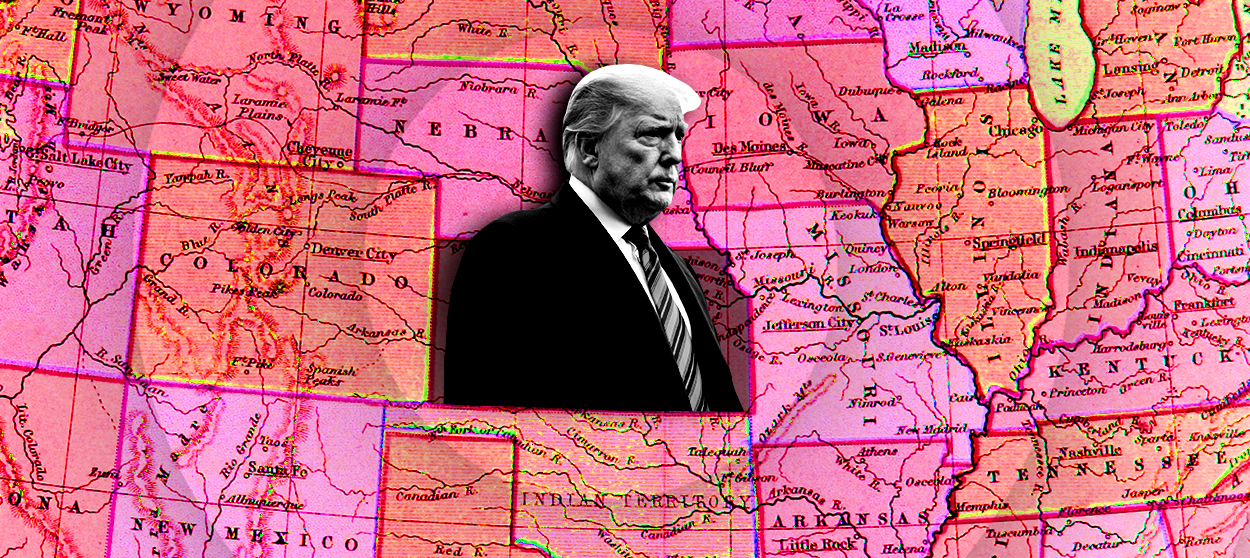Trump has taken the GOP's 'Kansas experiment' national — with predictable results
It's well past time for Republicans to face economic reality


A free daily email with the biggest news stories of the day – and the best features from TheWeek.com
You are now subscribed
Your newsletter sign-up was successful
It did not take long after former Kansas governor Sam Brownback signed the state's historic 2012 tax cuts — hailed at the time as "one of the largest income tax cuts in Kansas history" — into law for it to become apparent that critics of the so-called "Kansas experiment" had been correct, while proponents of the legislation had been spectacularly and unambiguously wrong.
Advocates had promised enormous growth and a plethora of new jobs, but over the next few years the Kansas experiment went exactly as critics had anticipated: economic growth lagged behind other states (and the national average), the state budget collapsed, and Kansas gained fewer jobs than its northern neighbor, Nebraska, which has about a million fewer people. Within a year of the bill's passage, state revenues plummeted by about 10 percent, creating a massive deficit that led lawmakers to cut spending in infrastructure, Medicaid, education, and other areas. The state's public school system was shattered, its roads and bridges deteriorated as money from the "highway fund" was transferred to pay for growing budget shortfalls, and the state's credit rating was downgraded, raising borrowing costs as debt piled up. By 2017, the state's Republican (and Democratic) lawmakers had no choice but to repeal many of the tax cuts after five years of fiscal and economic devastation, ultimately overriding Brownback's veto of the repeal legislation.
If what happened in Kansas from 2012 to 2017 was truly an experiment meant to prove or disprove certain theories about fiscal policy, then it was an unequivocal triumph for opponents of supply-side economics. And if proponents were seriously interested in the truth, they would have at the very least begun to question the central claims that have guided Republican fiscal policy for the better part of the last 50 years.
The Week
Escape your echo chamber. Get the facts behind the news, plus analysis from multiple perspectives.

Sign up for The Week's Free Newsletters
From our morning news briefing to a weekly Good News Newsletter, get the best of The Week delivered directly to your inbox.
From our morning news briefing to a weekly Good News Newsletter, get the best of The Week delivered directly to your inbox.
This did not happen, of course, and just a few months after Kansas ended its disastrous "experiment," Republicans in Washington started their own experiment, this time for the entire country. Repeating the same talking points we heard five years earlier in the Sunflower State, Republicans cut federal income tax rates for the wealthy and slashed the corporate tax from 35 percent to 21 percent, all the while promising that it would spur massive growth that would make it essentially revenue neutral — "We can pay for these tax cuts with economic growth," declared Treasury Secretary Steven Mnuchin. This was completely contrary to reality, and analysts forecasted a drop in government revenue by around $1.5 trillion over the next 10 years. It was even questionable whether the tax cuts would really spur much growth. "The experiment in Kansas has important implications for federal tax reform," wrote Brookings Institution's William Gale before the GOP tax bill, "the first being not to expect tax cuts to boost the economy much, if at all."
Just like the Kansas experiment, it hasn't taken long for critics of the "Trump experiment" to be vindicated. Last week, the Congressional Budget Office said that the federal deficit is set to reach $960 billion in the fiscal year of 2019 and projected that it would average $1.2 trillion annually over the next 10 years. That's an increase of nearly $400 billion from Obama's last year in office (and $300 billion from Trump's first year). This unprecedented growth of the deficit during a time of economic boom (when the deficit is typically expected to remain steady or even decline) is a direct consequence of the Republican tax cuts, along with a sharp increase in the wasteful and bloated defense budget.
Not surprisingly, the promised growth that the tax cuts were supposed to bring turned out to be modest at best, and the cuts haven't paid for themselves. According to new data from the Labor Department, the U.S. economy created 500,000 fewer jobs than initially estimated between January 2018 and March 2019, undercutting the president's claim that the tax cuts significantly boosted the economy. Historically low labor force participation (plus a high rate of "involuntary part-time work") also makes the low unemployment rate less impressive than it first appears.
Trump has been riding high on the economy for the past two years, but his reckless policies, from tax cuts to his trade war with China, are starting to catch up to him, and as signs of a coming recession become more apparent, the president has become even more detached from reality. The Daily Beast reported earlier this month that sources who have spoken with the president about a possible recession since 2017 say that Trump thinks "recessions or booms are often self-fulfilling prophecies," and believes that he can "will the economy in a positive direction by feeding optimism to the ‘American spirit.'" It's unclear if this is what he was trying to do on Friday, when he went on an unhinged (even by his standards) Twitter rant against China, ordering American companies to "immediately start looking for an alternative to China," which predictably caused the stock market to plunge. After the market closed, Trump announced that he was raising his 25 percent tariffs on $250 billion in Chinese goods to 30 percent, while increasing his planned tariffs on the $300 billion in remaining imports from 10 to 15 percent, ratcheting up the trade war.
A free daily email with the biggest news stories of the day – and the best features from TheWeek.com
The influence that presidents have over the economy has always been exaggerated by the media, but if a recession does come, it wouldn't be that misplaced to put a majority of blame on the Trump administration (at least for accelerating and exacerbating the crisis). Trump is unwittingly heightening the contradictions of American capitalism and the global economy at large, and, like Gov. Brownback in Kansas, he is unwilling to change course, even with the icebergs in sight.
The chief financial economist at MUFG Union Bank, Chris Rupkey, recently told the Washington Post that Congress and the Federal Reserve would be unable to combat another recession in the near future because of the already low interest rates (which have been close to zero for almost a decade) and the ballooning deficit. "Both sides are out of bullets. I've never seen a situation where there's a recession cloud on the horizon but Washington is totally unprepared to deal with a downturn in the economy." There are "precious few working tools left at policymakers' disposal," says another financial analyst for Société Générale, Albert Edwards, who sees a global recession right around the corner.
In Kansas, Republicans ultimately had to repeal their own policies and overrule their own governor's veto; it is doubtful whether Republicans in Washington would be willing to stand up to Trump. Republicans have been stubbornly denying reality for decades, and the more discredited their economic worldview becomes, the more committed they seem to become, demonstrating the great psychologist Leon Festinger's claim that those who are presented with "unequivocal and undeniable evidence" that their beliefs are wrong will frequently emerge "not only unshaken, but even more convinced of the truth of his beliefs than ever before."
Republicans started this war long before Trump's unceremonious arrival. Now the president seems to think he can not only "will the economy" in a positive direction but will reality to fit his fictional universe. As the economy stumbles, however, it may all come crashing down on that vision. On Sunday, at the G-7 gathering in France, Trump floated the idea of declaring a "national emergency" because of the trade war that he started with China; if a recession comes between now and the 2020 election, how the president will respond is anyone's guess.
Conor Lynch is a freelance journalist living in New York City. He has written for The New Republic, Salon, and Alternet.
